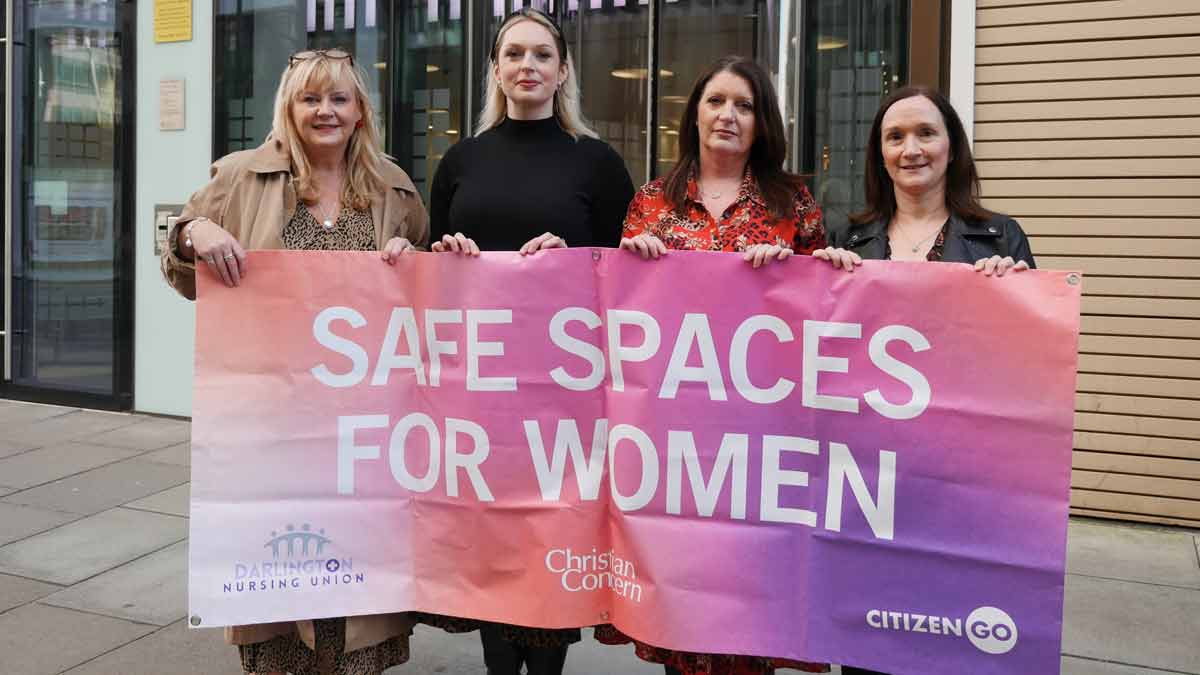- Four NHS nurses face misconduct probes over transgender changing room dispute.
- Nurses allege discrimination and sexual harassment, citing workplace privacy concerns.
- Supported by the Christian Legal Centre, they claim protection under the Equality Act 2010.
- The NMC is assessing whether a full investigation is required.
- The case renews debate over gender rights, single-sex spaces, and workplace inclusion in the NHS.
Four nurses from Darlington Memorial Hospital are under investigation by the Nursing and Midwifery Council (NMC) following complaints made by members of the public, after they raised objections to sharing a changing room with a transgender colleague.
The staff members; Bethany Hutchison, Lisa Lockey, Annice Grundy, and Tracey Hooper say they expressed discomfort about changing in front of Rose Henderson, who was born male and identifies as female but has not undergone surgical or hormonal transition.
After raising their concerns with the County Durham and Darlington NHS Foundation Trust, the nurses say they were told to be “more inclusive” and to “broaden their mindset.” The NHS trust, according to the nurses, also advised them to “re-educate” themselves on gender inclusion in the workplace — guidance they found dismissive of their concerns about privacy and dignity.

The four women have since filed a sexual harassment and discrimination claim against the NHS Trust, citing violations of the Equality Act 2010 and the Human Rights Act. They are being supported in their case by the Christian Legal Centre, which argues the nurses acted “in good faith” and in line with the NMC Code of Conduct.
However, the NMC has confirmed that it is still assessing whether the concerns require a full misconduct investigation, following four separate public complaints about the nurses’ actions.
In correspondence cited by The Telegraph, the NMC stated it would “assess whether the concerns raised require a full NMC investigation.”
According to the nurses, workplace conditions became “intimidating” after they lodged their complaint with human resources. “We started to feel quite intimidated,” Bethany said, claiming that the environment changed significantly after the issue was reported.
A sign reading “inclusive changing room” was later placed on the door of the facility, while the four nurses were moved to temporary changing areas. Henderson, meanwhile, continued to use the original room.

The case has reignited debate around gender identity rights and single-sex spaces in the UK’s healthcare system — a topic frequently linked to broader discussions on employment discrimination, human rights, and workplace equality law.
Claire Coutinho, Shadow Secretary of State for Women and Equalities, described the situation as “beyond belief,” calling it “madness” that the nurses are facing further disciplinary action.
“It is beyond belief that these four remarkable nurses may now be dragged through another vexatious disciplinary process,” Coutinho said. “Our institutions have been captured by an ideology that wants to pretend that biological sex isn’t real and puts the feelings of transgender women above the rights of women to get changed in dignity, privacy, and safety.”
Andrea Williams, Chief Executive of the Christian Legal Centre, argued that the nurses are being punished for “believing in biology.” She added, “They are not being targeted for misconduct, but for standing up for basic rights and safeguarding. These complaints should be dismissed without delay.”
Williams said the NMC’s handling of the case risks “suppressing lawful expression of beliefs within the medical profession.”
The NMC investigation remains at a preliminary stage. It has not yet been confirmed whether a formal disciplinary process will follow. The outcome could have wider implications for how UK healthcare institutions handle gender identity issues, workplace inclusion policies, and employee rights under discrimination law.









